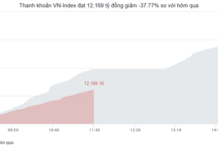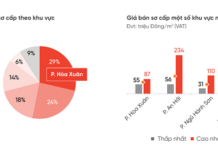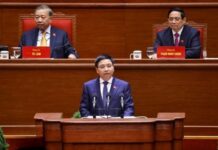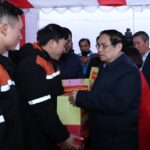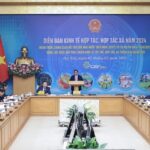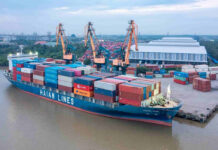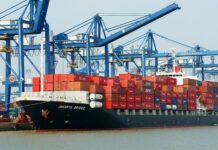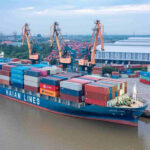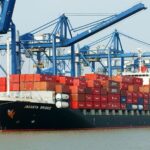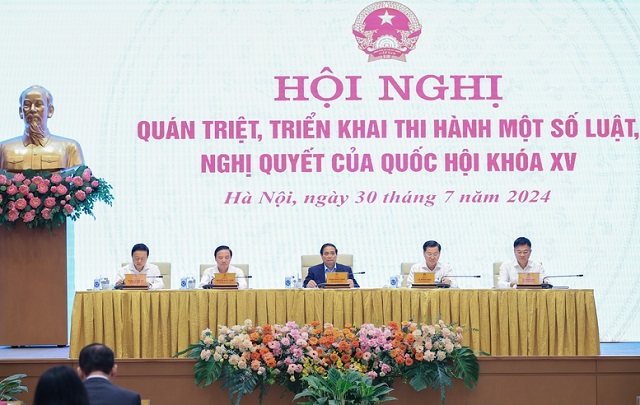
Prime Minister Pham Minh Chinh chairs the conference on promulgating and implementing a number of laws and resolutions of the XV National Assembly – Photo: VGP/Nhat Bac
|
On the morning of July 30, Prime Minister Pham Minh Chinh chaired a conference on promulgating and implementing a number of laws and resolutions of the XV National Assembly. This was the first conference, marking a new approach by the Government and the National Assembly Standing Committee in implementing laws and resolutions of the National Assembly.
The conference communicated the main contents, new points, and the preparation and implementation situation of Resolution No. 129/2024/QH15 of the National Assembly on the law and ordinance building program for 2025, adjusting the law and ordinance building program for 2024; Regulation No. 178-QD/TW dated June 27, 2024, of the Party Central Committee on controlling power, preventing and combating corruption and negativity in law-making; and the Land Law, Housing Law, Real Estate Business Law, Law on Credit Institutions, Road Law, Traffic Order and Safety Law, Social Insurance Law, and Capital Law.
“5 Creations” of the Institution for the Country’s Rapid and Sustainable Development
Concluding the conference, Prime Minister Pham Minh Chinh first of all, on behalf of the Government, expressed his sincere appreciation for the close coordination, support, and timely and effective companionship of the National Assembly, the National Assembly Standing Committee with the Government, and the agencies of the National Assembly with the ministries, branches, and localities in law-making and law enforcement within the functions, tasks, and powers of the Government and the ministries, branches, and localities.
The Prime Minister welcomed and basically agreed with the contents of the reports, discussions, and frank and constructive opinions of the delegates, especially the opinions of Vice President of the National Assembly Nguyen Khac Dinh. He assigned the Ministry of Justice, the relevant ministries, and branches to coordinate with the Government Office to fully absorb the opinions and complete and issue the Conclusion of this important conference to unify the implementation.
The Prime Minister emphasized several contents on the importance of institution and law building and completion; the results achieved; existing limitations and shortcomings; lessons learned; and tasks and solutions for the time coming.
Regarding the importance of institution and law building and completion, the Prime Minister clarified that institution building and completion is one of the three strategic breakthroughs and a major policy of the Party. Investing in institutions is investing in development.
The 13th National Party Congress emphasized the direction of continuing to strongly renew thinking and building and completing a sustainable institution on the economy, politics, culture, society, and the environment, … promptly overcoming difficulties and obstacles; unleashing all potentials and resources, creating new momentum for rapid and sustainable development.
The institution must go early and pave the way for development breakthroughs, maximizing potential and creativity, and meeting the needs of promoting industrialization, modernization, and international integration.
In the context of the fast-changing situation and high demands, the Prime Minister emphasized the requirement to promote a proactive, flexible, and creative spirit in the law-making and law enforcement process with thinking, methods, and methodology suitable to the conditions and circumstances of the country; concretizing and institutionalizing the Party’s guidelines and orientations and taking the people and businesses as the center and subject, with the people and businesses actively participating in this process, and all policies must be directed towards the people and businesses according to the mechanism of “Party leadership, State management, and people mastership.” When the law comes into life and is supported by the people, it serves the people and the country’s development requirements.
The Prime Minister outlined the “5 Creations” of the institution for the country’s rapid and sustainable development: (i) Create a legal basis to build and develop the capacity of the subjects, promoting the proper role of each subject; (ii) Create mechanisms and policies to mobilize and allocate all resources; harmonize the development interests of the subjects; (iii) Create a healthy, equal, transparent, appropriate, and effective “playing field” for the subjects in each field; (iv) Create a suitable legal framework for effective international integration, ensuring national and ethnic interests; (v) Create an effective control mechanism, preventing and overcoming risks and negativities.
Agreeing with the reports and opinions evaluating the results achieved, Prime Minister Pham Minh Chinh pointed out the existing limitations and shortcomings in this work, such as the process of building and issuing legal documents going through many layers, slowing down the progress of issuance and organization. Implementation; the organization of law enforcement is still a weak link; the debt situation of guiding documents detailing the implementation of laws and ordinances; the work of reviewing, systematizing, and codifying has not been promoted strongly; the propagation, dissemination, and education of laws are sometimes ineffective; the team of officials and civil servants working on law-making has not been strengthened to meet the requirements of the task; the mechanism of division of work, coordination between agencies in building and organizing the implementation of laws and ordinances is not uniform, sometimes dispersed, and sometimes local.
Analyzing the causes and drawing lessons, the Prime Minister emphasized that the most important lesson is the involvement, attention, and direction of the leaders with a passionate and responsible spirit, along with a close attachment to reality, the needs and aspirations of the people, and the difficulties that need to be overcome. Only discuss doing, not discuss backing down, and doing must have specific products and be effective to build a suitable, feasible, and effective system of laws.
Timely issuance of 121 documents detailing laws and resolutions
Regarding the orientations, key tasks, and solutions for the coming time, the Prime Minister requested the ministers, branch heads, and chairmen of the People’s Committees of the provinces and cities to continue with high determination, great efforts, and drastic actions, focusing on key tasks and targets; assigning “clear people, clear tasks, clear time, clear products, and clear effects” in law-making and law enforcement.
The Prime Minister clarified the action principle of “5 Promotings”, including: Promoting the progress and quality of law-making according to the set schedule; promoting the removal of difficulties and obstacles from reality; promoting the review, systematization, and codification; promoting the mechanism of division of work, decentralization, and delegation of suitable, feasible, and effective powers to the agencies in building and organizing the implementation of laws and ordinances; and promoting the propagation and education of laws.
Through this conference, the Government agreed with the National Assembly Standing Committee to continue reviewing the existing difficulties in the system of legal documents and researching and proposing to the National Assembly Standing Committee and the National Assembly to issue a law amending many laws.
Along with that, the Party Committee of the Government, the Party delegation of the National Assembly, coordinate closely, effectively, regularly, comprehensively, timely, and effectively. At the same time, continue to innovate the methods of organizing National Assembly sessions, such as a session that can be held in many rounds, combining direct and online methods; agencies of the National Assembly and the Government proactively coordinate from the early stages in law-making and law enforcement.
To synchronously and effectively deploy the laws and resolutions passed by the National Assembly, the Prime Minister requested the ministries, branches, agencies, and localities to continue to thoroughly grasp the guidelines and orientations of the Party put forth in the Documents of the XIII Congress, especially the Resolution of the 13th Party Congress, the resolutions and conclusions of the Central Committee, especially Resolution No. 27-NQ/TW on continuing to build and perfect the socialist law-governed state of Vietnam in the new period and Regulation No. 178-QD/TW dated June 27, 2024, of the Politburo on controlling power and preventing and combating corruption and negativity in law-making.
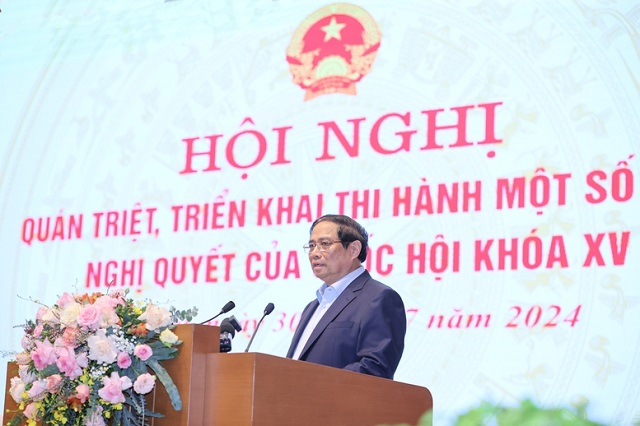 The Prime Minister requested to closely follow the specific requirements and tasks in deploying each law and resolution passed – Photo: VGP/Nhat Bac
|
Along with that, closely follow the specific requirements and tasks in deploying each law and resolution passed; urgently submit to the Prime Minister for approval the plans for the implementation of laws and resolutions of the National Assembly; allocate resources and prepare the necessary conditions to meet the requirements and tasks.
Strictly comply with the Law on Promulgation of Legal Documents, urgently build, issue, and submit for issuance 121 documents guiding the laws and resolutions passed at the 7th session to come into force at the same time as the laws and resolutions. Prepare well to implement new policies and regulations that will take effect earlier than the general effectiveness of the law; detail and guide the implementation of transitional contents to create a basis for smooth and uniform implementation, avoiding legal gaps.
Strengthen the propagation, dissemination, and introduction of the policies, contents of laws and resolutions, and guiding documents to help agencies, organizations, people, and businesses understand correctly and fully the regulations.
Tighten discipline and improve the sense of responsibility of the leaders, promote the initiative of the team of officials and civil servants, and strengthen supervision and inspection to prevent, detect, and strictly handle acts of corruption and negativity in law enforcement; overcome the situation of pushing, avoiding, and lack of responsibility in a part of officials and civil servants.
Proactively review and handle arising difficulties and problems, especially those related to administrative procedures, ensuring close connection between reviewing, proposing to handle difficulties and problems in legal documents, and reviewing and proposing to handle inappropriate administrative procedures that cause trouble for the people and businesses.
The Prime Minister requested the provinces and cities to proactively issue plans to deploy the above laws and resolutions in their localities; focus on reviewing, studying, and preparing necessary conditions and organizing the implementation of the powers and tasks assigned, especially the new tasks supplemented in the laws and resolutions, the mechanism and policy of experimentation and specificity applied in the locality.
Along with that, proactively handle according to the regulations of the law when problems arise in the locality in the process of implementing laws and resolutions; promptly report and propose plans for issues with difficulties for the competent authorities to synthesize, consider and handle, and study and amend and supplement regulations if necessary…
The Prime Minister suggested that the committees of the National Assembly and the National Assembly deputies continue to closely coordinate with the Government, ministries, and branches from the early stages in law-making to ensure the feasibility of the regulations in the law and resolution projects; strengthen supervision in law-making and law enforcement, promptly detect illegal contents and violations to propose appropriate handling measures.
The Prime Minister once again emphasized the requirement for the leaders of the ministries, branches, agencies, and localities and the officials and civil servants assigned tasks in law-making and law enforcement to raise their sense of responsibility, work emotionally with the spirit of dedication and responsibility, with thinking, methodology, and methodology suitable to the new situation, “only discuss doing, not discuss backing down”, clear division of work but uniform coordination, close and effective.
In the spirit of respecting the law, with the goal of promoting the building and perfection of the socialist law-governed state of Vietnam and renewing the mechanism of law enforcement, closely linking law-making with law enforcement according to Resolution No. 27 of the Central Committee; the Prime Minister hopes and believes that the issues discussed at the conference will be valuable lessons and experiences, and the existing difficulties in implementing laws and resolutions will have suitable solutions; after the conference, there will be better, more positive, and more effective changes in performing the functions, tasks, and powers of the agencies in law-making and law enforcement.
Prime Minister demands thorough inspection so that everyone can have Tet
Prime Minister Pham Minh Chinh emphasized the importance of ensuring a safe and joyful Lunar New Year for all citizens. Local authorities and organizations are responsible for making sure that everyone can celebrate the holiday in a healthy, efficient, and inclusive manner, ensuring that no one is left behind and that everyone can enjoy the Lunar New Year festivities.
Prime Minister: Collective economic development is an inevitable trend in the context of international integration.
According to the Prime Minister, collective economic development is an essential trend in the context of international integration, aligning with Vietnam’s socialist-oriented market economy. Collective economic organizations operate with a primary focus on economic benefits while also valuing political, cultural, and social benefits within the local area.


